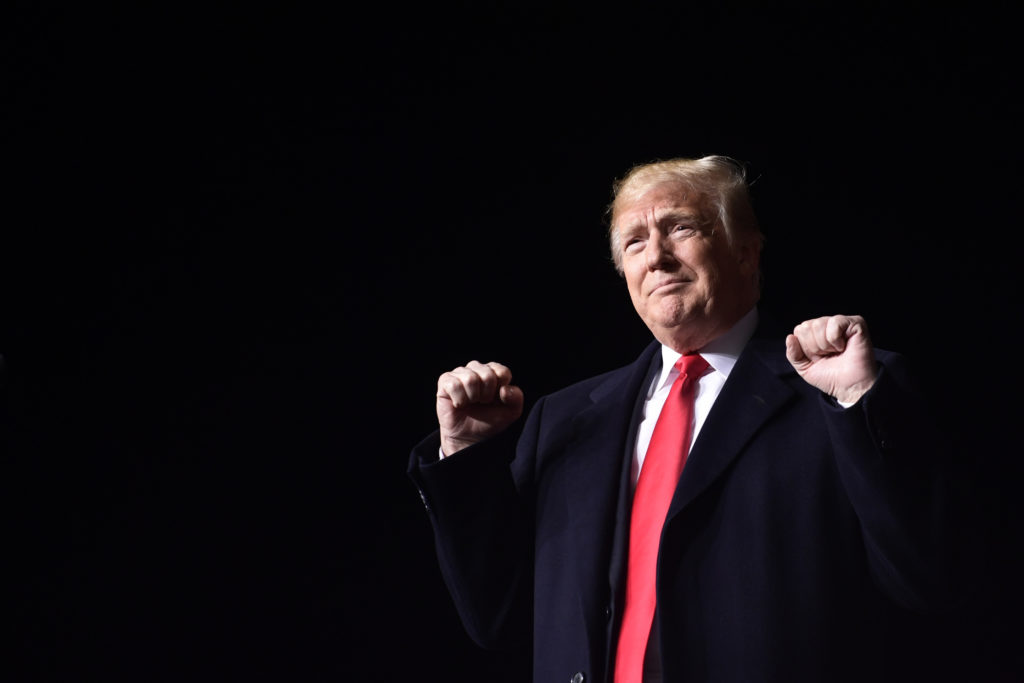U.S. feels the heat as Donald Trump pulls out of global climate pact

President Donald Trump is aiming to make the annual U.N.-sponsored climate talks underway in Madrid the last ones for full participation by the United States, which is the world’s No. 1 economy and the second-biggest carbon emitter. Trump dismisses climate change and he thumbed his nose at previous climate talks by twice sending White House delegations to promote climate-degrading coal. He is due to complete the U.S. withdrawal from the landmark Paris global climate accord on Nov. 4, 2020, the day after next year’s U.S. presidential election. If Trump loses that election, the next president could put the brakes on the withdrawal. House Speaker Nancy Pelosi, Democrat-California, and other political and business leaders, scientists and activists are traveling to Spain this week and next to drive home a counter message: U.S. cities, states and businesses representing a sizable chunk of the U.S. population and economy are committed to a global effort to slash emissions. “We’re still in it,” Pelosi told reporters at the talks, where she appeared with 14 other congressional Democrats on Monday to call climate change a growing threat to public health, economy and national security in the U.S.. Her comments were echoed by Mandela Barnes, Wisconsin’s lieutenant governor. “Regardless of whether or not we have the support of the nation’s highest office or not, this work is going to get done,” Barnes said. This year’s conference is expected to focus on fine-tuning the rules for reducing fossil fuel emissions by the roughly 200 signatories of the Paris agreement. It comes ahead of a big push at next year’s climate summit for more ambitious emissions-cutting targets. Experts say the United States’ repeated about-faces on the threat of climate change likely have done lasting damage. Even before Trump repudiated the deal backed by President Barack Obama, George W. Bush’s administration renounced the landmark Kyoto emissions protocol, negotiated in the late 1990s during Bill Clinton’s presidency, said Nigel Purvis, a State Department climate negotiator under Clinton and Bush. “The international community has concluded the United States is an unreliable partner,” Purvis said. Although the United States served formal notice last month that it intends to become the first country to withdraw from the Paris accord, it technically remains a participant until next Nov. 4. Marcia Bernicat, a senior State Department official, is leading the official U.S. delegation. The administration is taking part to ensure a level playing field that protects U.S. interests,” the State Department said in a statement. Advocates of the Paris accord say the U.S. withdrawal will leave American businesses to compete internationally under carbon-cutting rules set by other countries. Behind the scenes, U.S. diplomats have played a helpful role despite the planned U.S. withdrawal, pushing for transparency and solid rules as countries commit to specific targets for cutting emissions, delegates from other nations say privately. Publicly, Trump has catered to his base at the yearly talks. That includes dispatching a team to the 2017 and 2018 climate meetings to stage side events promoting coal-fired power production, one of the main sources of climate-wrecking emissions. His administration stood by fossil fuels “unapologetically,” White House energy envoy Wells Griffith said at the U.S. pro-fossil fuel event at last year’s talks in Poland. That drew chants from the audience of “Shame on you!” Griffith, who helped broker a coal deal in Ukraine, apparently refused a request by House impeachment investigators to discuss administration actions there. A woman who answered the phone at Griffith”s office Tuesday said no one there would say whether he planned to appear this year’s climate negotiations. Secretary of State Mike Pompeo last month repeated Trump’s argument that the Paris accord was an economic burden for the United States. Pompeo said technological innovation and the free market have made for continued U.S. declines in climate-changing emissions. It’s true U.S. carbon emissions are still falling under Trump, according to a study by Global Carbon Project, a group of international scientists who track emissions. The United States saw emissions drop 1.7 percent from 2018 to 2019, the same decline as in the European Union, even as China led in a 0.6 percent rise in emissions globally over the last year, the study said. U.S. experts say the drop in U.S. fossil fuel emissions is due in part to the decline of coal-fired power plants, losers in marketplace competition against cheaper natural gas and renewable sources despite Trump’s 2016 campaign pledges to save coal. The 2018 midterm elections, which gave Democrats control of the House, showed that embracing top-down government action to cut fossil fuel emissions can be part of a winning platform, at least in some parts of the country. In August 2017, 46 percent of Americans opposed U.S. withdrawal from the international agreement, while 29 percent supported it, according to a poll by The Associated Press-NORC Center and the Energy Policy Institute at the University of Chicago. This August, another AP-NORC poll found nearly two-thirds of Americans said the federal government should bear a lot of responsibility for combating climate change. “We hope … this is only a temporary farewell” for the U.S., German Foreign Minister Heiko Maas said last month at a diplomatic conference. Regardless, he said, other governments can’t count on Americans sorting out a lasting climate policy anytime soon. Ultimately, said Carla Frisch, a former energy policy expert at the Department of Energy under three U.S. administrations, U.S. climate action demands U.S. climate regulation, making cutting emissions the law and policy of the land. “We have to be all in,” Frisch said. “We also need the federal government, to get where we need to go.”” By Ellen Knickmeyer Associated Press Associated Press writers Frank Jordans in Berlin, and Seth Borenstein and Hannah Fingerhut in Washington contributed to this report. Republished with the Permission of the Associated Press.
Fiery disagreements as Donald Trump impeachment hearing opens

The House Judiciary Committee’s first impeachment hearing quickly burst into partisan infighting Wednesday as Democrats charged that President Donald Trump must be removed from office for enlisting foreign interference in U.S. elections and Republicans angrily retorted there were no grounds for such drastic action. The panel responsible for drafting articles of impeachment convened as Trump’s team was fanning out across Capitol Hill. Vice President Mike Pence met behind closed doors with House Republicans, and Senate Republicans were to huddle with the White House counsel as GOP lawmakers stand with the president and Democrats charge headlong into what has become a one-party drive to impeach him. Chairman Jerrold Nadler, Democrat-New York, gaveled open the hearing saying, “’The facts before us are undisputed.” Nadler said Trump’s phone call with Ukraine’s president last July wasn’t the first time Trump sought a foreign power to influence American elections, after Russian interference in 2016, and if left unchecked he could do again in next year’s campaign. “We cannot wait for the election to address the present crisis,” Nadler said. “The president has shown us his pattern of conduct. If we do not act to hold him in check, now, President Trump will almost certainly try again to solicit interference in the election for his personal political gain.” Republicans protested the proceedings as unfair to the president, the dredging up of unfounded allegations as part of an effort to undo the 2016 election and remove Trump from office. “You just don’t like the guy,” said Rep. Doug Collins of Georgia, the top Republican on the panel. He called the proceedings a “disgrace” and a “sham.” Several Republicans immediately objected to the process, interjecting procedural questions, and they planned to spend much of the session interrupting, delaying and questioning the rules. House Speaker Nancy Pelosi said Democrats “haven’t made a decision” yet on whether there will be a vote on impeachment. She also meeting privately with the Democratic caucus. But a vote by Christmas appears increasingly likely with the release of a 300-page report by Democrats on the House Intelligence Committee that found “serious misconduct” by the president. Intelligence Committee Chairman Adam Schiff, Democrat-California, told The Associated Press. “Americans need to understand that this president is putting his personal political interests above theirs. And that it’s endangering the country.” The Judiciary Committee heard Wednesday from legal experts, delving particularly into the issue of whether Trump’s actions stemming from the July 25 phone call with Ukraine’s president rose to the constitutional level of “bribery” or “high crimes and misdemeanors” warranting impeachment. The report laid out evidence that the Democrats say shows Trump’s efforts to seek foreign intervention in the U.S. election and then obstruct the House’s investigation. Trump told reporters in London, where he was attending a NATO meeting, that he doubted many people would watch the live hearing “because it’s going to be boring.” Trump did phone in to the House GOP’s morning meeting with Pence to talk with House Minority Leader Kevin McCarthy. The California Republican said impeachment didn’t come up. “The unity has been very positive,” he said. New telephone call records released with the report deepen Trump lawyer Rudy Giuliani’s known involvement in what House investigators called the “scheme” to use the president’s office for personal political gain by enlisting a foreign power, Ukraine, to investigate Democrats including Joe Biden, and intervene in the American election process. Trump told reporters he really doesn’t know why Giuliani was calling the White House’s Office of Management and Budget, which was withholding $400 million in military aid to the ally confronting an aggressive Russia at its border. “’You have to ask him,” Trump said. “Sounds like something that’s not so complicated. … No big deal.” At the hearing, the three legal experts called by Democrats backed impeachment. Noah Feldman, a Harvard Law School professor, said he considered it clear that the president’s conduct met the definition of “high crimes and misdemeanors/” Pamela Karlan, a Stanford Law School professor and former Obama administration Justice Department official, said the president’s action constituted an especially serious abuse of power “because it undermines democracy itself.” Republican witness Jonathan Turley, a law professor at George Washington University, said that the Democrats were bringing a “slipshod impeachment” case against the president, but he didn’t excuse the president’s behavior. “It is not wrong because President Trump is right,” according to Turley. “A case for impeachment could be made, but it cannot be made on this record,” he said. The political risks are high for all parties as the House presses only the fourth presidential impeachment inquiry in U.S. history. Based on two months of investigation sparked by a still-anonymous government whistleblower’s complaint, the Intelligence Committee’s Trump-Ukraine Impeachment Inquiry Report relies heavily on testimony from current and former U.S. officials who defied White House orders not to appear. The inquiry found that Trump “solicited the interference of a foreign government, Ukraine, to benefit his reelection,” Schiff wrote in the report’s preface. In doing so, the president “sought to undermine the integrity of the U.S. presidential election process, and endangered U.S. national security,” the report said. When Congress began investigating, it added, Trump obstructed the investigation like no other president in history. Along with revelations from earlier testimony, the new phone records raised fresh questions about Giuliani’s interactions with the top Republican on the intelligence panel, Rep. Devin Nunes of California. Nunes declined to comment. Schiff said his panel would continue its probe. Republicans defended the president in a 123-page rebuttal claiming Trump never intended to pressure Ukraine when he asked for a “favor” — investigations of Democrats and Biden and his son. They say the military aid the White House was withholding was not being used as leverage, as Democrats claim — and besides, the $400 million was ultimately released, although only after a congressional outcry. For Republicans falling in line behind Trump, the inquiry is simply a “hoax.” Trump criticized the House for pushing forward with the proceedings while he was overseas, a breach of political decorum that traditionally leaves partisan


